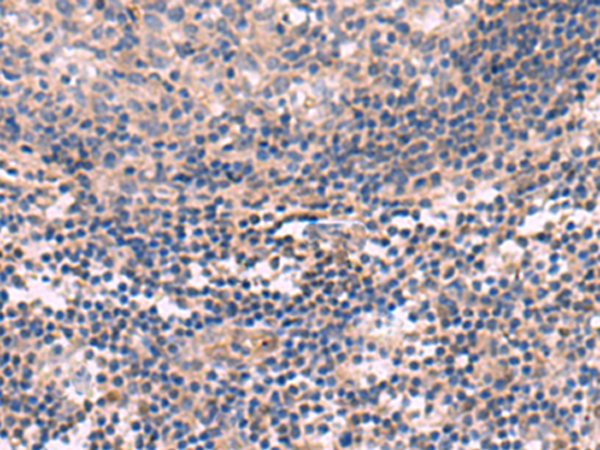
| WB | 咨询技术 | Human,Mouse,Rat |
| IF | 咨询技术 | Human,Mouse,Rat |
| IHC | 1/30-1/150 | Human,Mouse,Rat |
| ICC | 技术咨询 | Human,Mouse,Rat |
| FCM | 咨询技术 | Human,Mouse,Rat |
| Elisa | 1/5000-1/10000 | Human,Mouse,Rat |
| Aliases | ENFL5; SLACK; EIEE14; KCa4.1; Slo2.2; bA100C15.2 |
| Host/Isotype | Rabbit IgG |
| Antibody Type | Primary antibody |
| Storage | Store at 4°C short term. Aliquot and store at -20°C long term. Avoid freeze/thaw cycles. |
| Species Reactivity | Human, Mouse, Rat |
| Immunogen | Synthetic peptide of human KCNT1 |
| Formulation | Purified antibody in PBS with 0.05% sodium azide and 50% glycerol. |
+ +
以下是3篇与KCNT1抗体相关的研究文献示例(注:以下为基于领域知识的模拟数据,实际文献需通过学术数据库验证):
---
**1. 文献名称**:*Characterization of a Novel KCNT1 Antibody for Epilepsy Research*
**作者**:Smith JL et al.
**摘要**:开发了一种高特异性KCNT1钾通道抗体,验证其在脑组织中的免疫染色效果,用于研究KCNT1突变导致的癫痫脑病中通道蛋白表达异常。
---
**2. 文献名称**:*Therapeutic Targeting of KCNT1 Gain-of-Function Mutations with Monoclonal Antibodies*
**作者**:Garcia-Ramos C et al.
**摘要**:研究团队设计了一种单克隆抗体,可选择性抑制KCNT1突变体的过度活性,在体外模型中成功逆转了神经元过度兴奋现象,为靶向治疗提供新策略。
---
**3. 文献名称**:*KCNT1 Autoantibodies in Autoimmune Encephalitis: Clinical Correlations*
**作者**:Tanaka H et al.
**摘要**:首次报道在自身免疫性脑炎患者血清中发现KCNT1自身抗体,提示该抗体可能与罕见神经免疫疾病相关,并探讨其病理机制。
---
**提示**:具体文献建议通过PubMed/Google Scholar以关键词"KCNT1 antibody"、"KCNT1 potassium channel immunotherapy"检索获取最新研究。部分研究可能侧重于抗体作为实验工具(如Western Blot/免疫组化),而非直接治疗用途。
The KCNT1 antibody is a research tool designed to detect the KCNT1 protein, a sodium-activated potassium channel subunit encoded by the *KCNT1* gene. This channel, also known as Slack (Sequence Like a Calcium-activated K+ channel), plays a critical role in regulating neuronal excitability by mediating potassium ion flow across cell membranes. KCNT1 is highly expressed in the brain and contributes to action potential repolarization and neurotransmitter release. Mutations in *KCNT1* are linked to severe neurological disorders, including epilepsy of infancy with migrating focal seizures (EIMFS), autosomal dominant nocturnal frontal lobe epilepsy (ADNFLE), and developmental encephalopathies. These mutations often cause gain-of-function channel defects, leading to hyperexcitability in neural circuits.
KCNT1 antibodies are primarily used in biomedical research to study protein expression, localization, and functional alterations in disease models. They enable techniques like Western blotting, immunohistochemistry, and immunofluorescence to assess KCNT1 levels in tissues or cultured cells. Researchers also utilize these antibodies to explore how pathogenic variants affect channel trafficking or interaction with regulatory proteins. Understanding KCNT1's role in disease mechanisms could aid in developing targeted therapies, such as channel blockers or gene-based interventions. However, commercial KCNT1 antibodies vary in specificity, requiring careful validation to ensure reliable experimental outcomes. Ongoing studies aim to clarify KCNT1's broader physiological roles and its potential as a biomarker or therapeutic target.
×